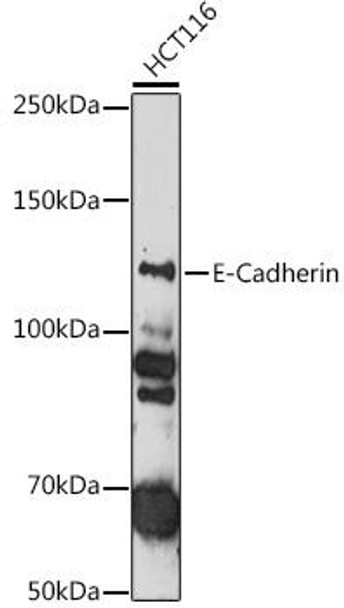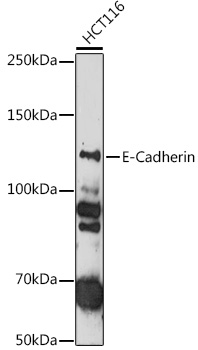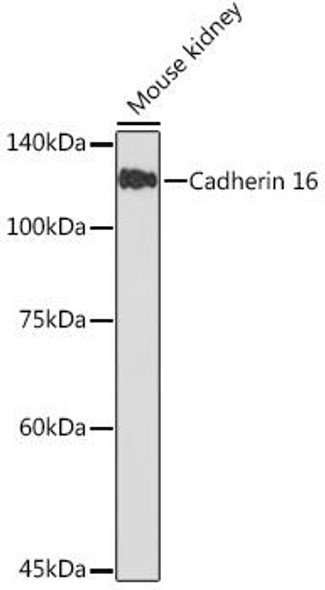Anti-E-Cadherin Antibody (CAB11453)
- SKU:
- CAB11453
- Product type:
- Antibody
- Reactivity:
- Human
- Mouse
- Host Species:
- Rabbit
- Isotype:
- IgG
- Antibody Type:
- Polyclonal Antibody
- Research Area:
- Cell Biology
Description
| Antibody Name: | Anti-E-Cadherin Antibody |
| Antibody SKU: | CAB11453 |
| Antibody Size: | 20uL, 50uL, 100uL |
| Application: | WB |
| Reactivity: | Human, Mouse |
| Host Species: | Rabbit |
| Immunogen: | Recombinant fusion protein containing a sequence corresponding to amino acids 373-622 of human E-Cadherin (NP_004351.1). |
| Application: | WB |
| Recommended Dilution: | WB 1:500 - 1:2000 |
| Reactivity: | Human, Mouse |
| Positive Samples: | HCT116 |
| Immunogen: | Recombinant fusion protein containing a sequence corresponding to amino acids 373-622 of human E-Cadherin (NP_004351.1). |
| Purification Method: | Affinity purification |
| Storage Buffer: | Store at -20°C. Avoid freeze / thaw cycles. Buffer: PBS with 0.02% sodium azide, 50% glycerol, pH7.3. |
| Isotype: | IgG |
| Sequence: | PIFN PTTY KGQV PENE ANVV ITTL KVTD ADAP NTPA WEAV YTIL NDDG GQFV VTTN PVNN DGIL KTAK GLDF EAKQ QYIL HVAV TNVV PFEV SLTT STAT VTVD VLDV NEAP IFVP PEKR VEVS EDFG VGQE ITSY TAQE PDTF MEQK ITYR IWRD TANW LEIN PDTG AIST RAEL DRED FEHV KNST YTAL IIAT DNGS PVAT GTGT LLLI LSDV NDNA PIPE PRTI FFCE RNPK PQVI NIID ADLP PN |
| Gene ID: | 999 |
| Uniprot: | P12830 |
| Cellular Location: | Cell junction, Cell membrane, Endosome, Golgi apparatus, Single-pass type I membrane protein, trans-Golgi network |
| Calculated MW: | 90kDa/97kDa |
| Observed MW: | 130KDa |
| Synonyms: | Arc-1, CD324, CDHE, ECAD, LCAM, UVO, CDH1, E-Cadherin |
| Background: | This gene encodes a classical cadherin of the cadherin superfamily. Alternative splicing results in multiple transcript variants, at least one of which encodes a preproprotein that is proteolytically processed to generate the mature glycoprotein. This calcium-dependent cell-cell adhesion protein is comprised of five extracellular cadherin repeats, a transmembrane region and a highly conserved cytoplasmic tail. Mutations in this gene are correlated with gastric, breast, colorectal, thyroid and ovarian cancer. Loss of function of this gene is thought to contribute to cancer progression by increasing proliferation, invasion, and/or metastasis. The ectodomain of this protein mediates bacterial adhesion to mammalian cells and the cytoplasmic domain is required for internalization. This gene is present in a gene cluster with other members of the cadherin family on chromosome 16. |
| UniProt Protein Function: | Function: Cadherins are calcium-dependent cell adhesion proteins. They preferentially interact with themselves in a homophilic manner in connecting cells; cadherins may thus contribute to the sorting of heterogeneous cell types. CDH1 is involved in mechanisms regulating cell-cell adhesions, mobility and proliferation of epithelial cells. Has a potent invasive suppressor role. It is a ligand for integrin alpha-E/beta-7. Ref.22E-Cad/CTF2 promotes non-amyloidogenic degradation of Abeta precursors. Has a strong inhibitory effect on APP C99 and C83 production. Ref.22 |
| UniProt Protein Details: | Subunit structure: Homodimer; disulfide-linked. Component of an E-cadherin/ catenin adhesion complex composed of at least E-cadherin/CDH1, beta-catenin/CTNNB1 or gamma-catenin/JUP, and potentially alpha-catenin/CTNNA1; the complex is located to adherens junctions. The stable association of CTNNA1 is controversial as CTNNA1 was shown not to bind to F-actin when assembled in the complex. Alternatively, the CTNNA1-containing complex may be linked to F-actin by other proteins such as LIMA1. Interaction with PSEN1, cleaves CDH1 resulting in the disassociation of cadherin-based adherens junctions (CAJs). Interacts with AJAP1, CTNND1 and DLGAP5 By similarity. Interacts with TBC1D2. Interacts with LIMA1. Interacts with CAV1. Interacts with the TRPV4 and CTNNB1 complex By similarity. Ref.16 Ref.17 Ref.18 Ref.19 Ref.20 Ref.25 Ref.26 Subcellular location: Cell junction. Cell membrane; Single-pass type I membrane protein. Endosome. Golgi apparatus › trans-Golgi network. Note: Colocalizes with DLGAP5 at sites of cell-cell contact in intestinal epithelial cells. Anchored to actin microfilaments through association with alpha-, beta- and gamma-catenin. Sequential proteolysis induced by apoptosis or calcium influx, results in translocation from sites of cell-cell contact to the cytoplasm. Colocalizes with RAB11A endosomes during its transport from the Golgi apparatus to the plasma membrane. Ref.4 Ref.18 Ref.21 Tissue specificity: Non-neural epithelial tissues. Induction: Expression is repressed by MACROD1. Ref.23 Post-translational modification: During apoptosis or with calcium influx, cleaved by a membrane-bound metalloproteinase (ADAM10), PS1/gamma-secretase and caspase-3 to produce fragments of about 38 kDa (E-CAD/CTF1), 33 kDa (E-CAD/CTF2) and 29 kDa (E-CAD/CTF3), respectively. Processing by the metalloproteinase, induced by calcium influx, causes disruption of cell-cell adhesion and the subsequent release of beta-catenin into the cytoplasm. The residual membrane-tethered cleavage product is rapidly degraded via an intracellular proteolytic pathway. Cleavage by caspase-3 releases the cytoplasmic tail resulting in disintegration of the actin microfilament system. The gamma-secretase-mediated cleavage promotes disassembly of adherens junctions. Ref.4 Ref.12 Ref.15N-glycosylation at Asn-637 is essential for expression, folding and trafficking. Involvement in Disease: Defects in CDH1 are the cause of hereditary diffuse gastric cancer (HDGC) [ MIM:137215]. An autosomal dominant cancer predisposition syndrome with increased susceptibility to diffuse gastric cancer. Diffuse gastric cancer is a malignant disease characterized by poorly differentiated infiltrating lesions resulting in thickening of the stomach. Malignant tumors start in the stomach, can spread to the esophagus or the small intestine, and can extend through the stomach wall to nearby lymph nodes and organs. It also can metastasize to other parts of the body. Note=Heterozygous germline mutations CDH1 are responsible for familial cases of diffuse gastric cancer. Somatic mutations in the has also been found in patients with sporadic diffuse gastric cancer and lobular breast cancer. Ref.36 Ref.41Defects in CDH1 are a cause of susceptibility to endometrial cancer (ENDMC) [ MIM:608089].Defects in CDH1 are a cause of susceptibility to ovarian cancer (OC) [ MIM:167000]. Ovarian cancer common malignancy originating from ovarian tissue. Although many histologic types of ovarian neoplasms have been described, epithelial ovarian carcinoma is the most common form. Ovarian cancers are often asymptomatic and the recognized signs and symptoms, even of late-stage disease, are vague. Consequently, most patients are diagnosed with advanced disease. Sequence similarities: Contains 5 cadherin domains. Sequence caution: The sequence AAA61259.1 differs from that shown. Reason: Frameshift at positions 16, 22, 25, 28, 31, 34, 52, 67, 73, 76, 94, 102, 633 and 636. |
| NCBI Summary: | This gene is a classical cadherin from the cadherin superfamily. The encoded protein is a calcium dependent cell-cell adhesion glycoprotein comprised of five extracellular cadherin repeats, a transmembrane region and a highly conserved cytoplasmic tail. Mutations in this gene are correlated with gastric, breast, colorectal, thyroid and ovarian cancer. Loss of function is thought to contribute to progression in cancer by increasing proliferation, invasion, and/or metastasis. The ectodomain of this protein mediates bacterial adhesion to mammalian cells and the cytoplasmic domain is required for internalization. Identified transcript variants arise from mutation at consensus splice sites. [provided by RefSeq] |
| UniProt Code: | P12830 |
| NCBI GenInfo Identifier: | 399166 |
| NCBI Gene ID: | 999 |
| NCBI Accession: | P12830.3 |
| UniProt Secondary Accession: | P12830,Q13799, Q14216, Q15855, Q16194, Q4PJ14, |
| UniProt Related Accession: | P12830,Q9UII7,Q9UII8 |
| Molecular Weight: | 97,456 Da |
| NCBI Full Name: | Cadherin-1 |
| NCBI Synonym Full Names: | cadherin 1, type 1, E-cadherin (epithelial) |
| NCBI Official Symbol: | CDH1 |
| NCBI Official Synonym Symbols: | UVO; CDHE; ECAD; LCAM; Arc-1; CD324 |
| NCBI Protein Information: | cadherin-1; CAM 120/80; E-Cadherin; uvomorulin; cell-CAM 120/80; OTTHUMP00000174868; epithelial cadherin; cadherin 1, E-cadherin (epithelial); calcium-dependent adhesion protein, epithelial |
| UniProt Protein Name: | Cadherin-1 |
| UniProt Synonym Protein Names: | CAM 120/80; Epithelial cadherin; E-cadherin; Uvomorulin |
| Protein Family: | Cadherin |
| UniProt Gene Name: | CDH1 |
| UniProt Entry Name: | CADH1_HUMAN |








